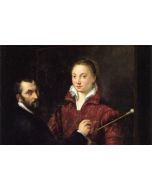Movements in art: Post-Impressionism
This course will be delivered online. See the ‘What is the course about?’ section in course details for more information.
- Course Code: VB614
- Dates: 19/06/24 - 03/07/24
- Time: 14:00 - 16:00
- Taught: Wed, Daytime
- Duration: 3 sessions (over 3 weeks)
- Location: Online
- Tutor: Elizabeth Eyres
Course Code: VB614
Duration: 3 sessions (over 3 weeks)
Please note: We offer a wide variety of financial support to make courses affordable. Just visit our online Help Centre for more information on a range of topics including fees, online learning and FAQs.
What is the course about?
We will study the work of the four major painters who broke free of Impressionism and sought independent artistic expression: Paul Cézanne, Paul Gauguin (whose work is also known as Symbolism), Van Gogh, and Seurat (whose work is also known as Neo-Impressionism and Divisionism). While grouped under the term “Post-Impressionists”, these artists often worked independently and followed totally diverse stylistic paths.
In this short, online course we will explore the contexts of why the post impressionists' work differed so much and what they were aiming to achieve. These artists also left a considerable legacy, and we will also examine what impact this had on the following generation of painters.
This is a live online course. You will need:
- Internet connection. The classes work best with Chrome.
- A computer with microphone and camera is best (e.g. a PC/laptop/iMac/MacBook), or a tablet/iPad/smart phone/iPhone if you don't have a computer.
- Earphones/headphones/speakers.
We will contact you with joining instructions before your course starts.
What will we cover?
• We will discuss the subject matter and formal characteristics of the work of Cézanne, Gauguin, Van Gogh, and Seurat and relate these to the social and cultural contexts of their lives and the societies they inhabited
• We will consider the impact of non-Western influences on the work of Gauguin and Van Gogh and how new theories about colour impacted on the work of Seurat
• We will examine why and how these painters left such an important legacy.
What will I achieve?
By the end of this course you should be able to...
- Discuss what each of the four Post-Impressionists studied on this course was aiming to achieve
- You will be able to describe the key characteristics of their work
- You will be able to identify the work of each of the artists through their formal qualities.
What level is the course and do I need any particular skills?
This course is suitable for all levels.
You should be able to follow simple written and verbal instructions, demonstrations, hand-outs and health and safety information, and will be invited to take part in group discussion.
How will I be taught, and will there be any work outside the class?
You will be taught with short lectures, slides, and group discussions.
Are there any other costs? Is there anything I need to bring?
You might wish to bring a notebook. You might wish to buy some of the books on any reading list given out in class.
When I've finished, what course can I do next?
Modern Art: movements 1850-1900
Modern Art: movements 1900-1950.
Liz Keevill Eyres worked as a textile designer in the fashion industry for four years and then as a magazine journalist specializing in interior design for 13 years. Her first degree was at Camberwell School of Art which she did at the same time as completing a degree in History and Art History with the Open University. Liz studied and has taught at Kingston University, where she lead modules and lectured in history of art, design history and architecture for ten years and ran study visits both at home and abroad. Liz has researched into English Modernist textile design of the 1950s and the professional practice of the provincial Edwardian architect, in particular Norwich-based architect George Skipper.
Please note: We reserve the right to change our tutors from those advertised. This happens rarely, but if it does, we are unable to refund fees due to this. Our tutors may have different teaching styles; however we guarantee a consistent quality of teaching in all our courses.
